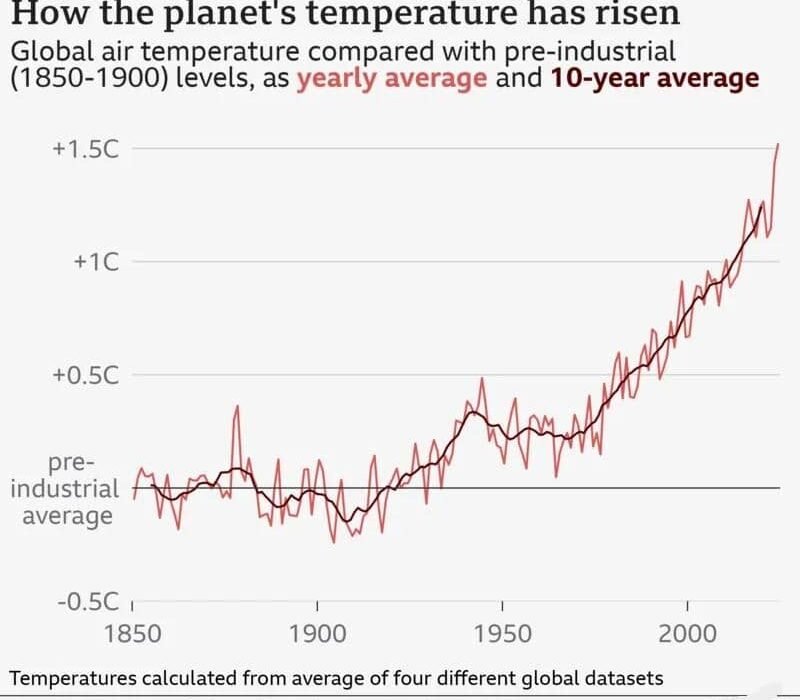GLOBAL WARMING ACCELERATES AS CARBON BUDGET SHRINKS DRAMATICALLY

The planet is on course to exceed the critical 1.5°C global warming threshold within just three years, unless urgent action is taken to slash greenhouse gas emissions.
This is the alarming conclusion from a new report released by a coalition of over 60 of the world’s leading climate scientists.
The report is the most current and comprehensive update on the state of global warming—and it paints a stark picture: at present levels of carbon dioxide (CO₂) emissions, the Earth’s carbon budget will be exhausted by 2028, all but ensuring a breach of the 1.5°C target agreed to in the 2015 Paris Climate Agreement.
WHO IS WARNING US, AND WHAT ARE THEY SAYING?
Prof. Piers Forster, Director of the Priestley Centre for Climate Futures, noted that “Things are all moving in the wrong direction. We’re seeing unprecedented changes. Earth’s heating and sea-level rise are both accelerating.”
Correspondingly, UK Met Office and University of Bristol, Dr. Matthew Palmer stated that “The energy imbalance is a very worrying number—it’s more than double the rate of the 1970s. That excess heat is destabilizing ecosystems and public health globally.”
Prof. Joeri Rogelj of Imperial College London also explained that “every fraction of warming matters. Relying on carbon removal technologies is a dangerous gamble—once we pass 1.5°C, there’s no guarantee we can reverse the damage.”
HOW DID WE GET HERE?
Since the 2015 Paris Agreement, nearly 200 countries pledged to limit warming to 1.5°C above pre-industrial levels, hoping to avoid catastrophic environmental and health outcomes. However, the reality tells a different story, as-
- CO₂ emissions remain at historic highs, exceeding 40 billion tonnes annually.
- Rampant deforestation, especially in carbon-rich tropical regions, continues.
- Fossil fuel dependence persists, despite commitments to renewable energy.
As a result, the remaining carbon budget-the total CO₂ that can still be emitted for a 50% chance of staying below 1.5°C—has plummeted from 500 billion tonnes in 2020 to just 130 billion tonnes in 2025.
WHERE AND WHEN ARE WE SEEING THE IMPACTS?
In 2024, global average air temperatures reached 1.36°C above 19th-century levels, with a 10-year average now sitting at 1.24°C.
Sea levels are rising twice as fast as they were in the 1990s, endangering millions in coastal regions, from Bangladesh to Miami.
In July 2022, the UK experienced an unprecedented 40°C heatwave, causing widespread health emergencies and infrastructure failures.
Oceans absorb 90% of the excess heat, disrupting marine ecosystems and leading to mass coral bleaching and declining fish stocks vital for global nutrition.
THE HEALTH EMERGENCY BEHIND THE CLIMATE NUMBERS
This isn’t just an environmental story—it’s a public health crisis:
- Heat-related deaths are rising globally, especially among the elderly and young children.
- Respiratory diseases are worsened by rising temperatures and air pollution.
- Vector-borne diseases like malaria and dengue are spreading into new regions.
- Mental health disorders tied to climate anxiety and climate-related displacement are escalating.
WHY IT MATTERS:
The researchers stress that every 0.1°C increase magnifies risks—from floods to food insecurity, from wildfires to water shortages. While the planet may not cross the 1.5°C line until 2030, the countdown is no longer theoretical—it’s real, and it’s urgent.
WHAT’S NEXT?
To reverse course, scientists are calling for:
- Immediate cuts to fossil fuel use
- Massive reforestation and land restoration
- Rapid investment in clean energy and climate-resilient health systems
- A shift away from carbon removal fantasy toward aggressive emission reduction
“There’s still a small window of opportunity,” said Prof. Forster. “But we must act now—not in three years, not next year—now.”
THE CLIMATE CLOCK IS TICKING
The evidence is clear, the science is sound, and the consequences are unfolding before our eyes. As the planet approaches the 1.5°C tipping point, inaction is no longer an option. The coming years will define not only the health of our environment but the health and survival of billions
Three years. That’s the deadline. The time to act is today.









